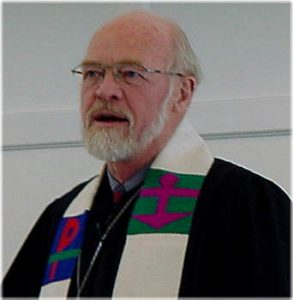 Eugene Peterson (b.1932) is a pastor’s pastor. He is the author of the best-selling The Message, which is his translation of the Bible into contemporary American language. He is an ordained Presbyterian (PCUSA) pastor who served as the founding pastor of Christ Our King Presbyterian Church in Bel Air, Maryland for twenty-nine years before retiring in 1991. Following his retirement from parish ministry, he served in academia until retiring from that role in 2006. Peterson is the author of over thirty books. His most recent book was one of my top books of 2011: The Pastor: A Memoir (read my review).
Eugene Peterson (b.1932) is a pastor’s pastor. He is the author of the best-selling The Message, which is his translation of the Bible into contemporary American language. He is an ordained Presbyterian (PCUSA) pastor who served as the founding pastor of Christ Our King Presbyterian Church in Bel Air, Maryland for twenty-nine years before retiring in 1991. Following his retirement from parish ministry, he served in academia until retiring from that role in 2006. Peterson is the author of over thirty books. His most recent book was one of my top books of 2011: The Pastor: A Memoir (read my review).
Recently, he was interviewed by Jonathan Merritt. In response to Merritt’s question asking him to offer advice to today’s seminary students about what “is at the heart” of pastoring, Peterson answered:
I’d tell them that pastoring is not a very glamorous job. It’s a very taking-out-the-laundry and changing-the-diapers kind of job. And I think I would try to disabuse them of any romantic ideas of what it is. As a pastor, you’ve got to be willing to take people as they are. And live with them where they are. And not impose your will on them. Because God has different ways of being with people, and you don’t always know what they are.
The one thing I think is at the root of a lot of pastors’ restlessness and dissatisfaction is impatience. They think if they get the right system, the right programs, the right place, the right location, the right demographics, it’ll be a snap. And for some people it is: if you’re a good actor, if you have a big smile, if you are an extrovert. In some ways, a religious crowd is the easiest crowd to gather in the world. Our country’s full of examples of that. But for most, pastoring is a very ordinary way to live. And it is difficult in many ways because your time is not your own, for the most part, and the whole culture is against you. This consumer culture, people grow up determining what they want to do by what they can consume. And the Christian gospel is just quite the opposite of that. And people don’t know that. And pastors don’t know that when they start out. We’ve got a whole culture that is programmed to please people, telling them what they want. And if you do that, you might end up with a big church, but you won’t be a pastor.
So What?
I have had the opportunity to study at three different seminaries, and participate in continuing education opportunities provided by several more. I have also served as a mentor to multiple seminarians in the years since finishing my own formal education. While I am thankful for the general direction in which theological higher education is headed, I do think the role of pastor in a congregational context is increasingly varied. Peterson, however, suggests that the central part of pastoral identity should be unchanging.
- How does the idea of pastoral ministry as “not very glamorous,” as “a very taking-out-the-laundry and changing-the-diapers kind of job”, and as “a very ordinary way to live” strike you?
- Do you agree that pastors who become people pleasers often do so only by losing pastoral authenticity?
- During your lifetime what pastor has had the greatest impact on you? Share a bit of your experience.